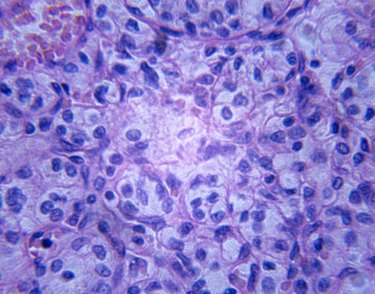
There is evidence that links protein supplementation with decreased renal, or kidney, function. The results of a research study reported by the "Harvard Gazette" looked at the effects of high-protein diets on renal function in women. The study found that participants who already had impaired kidney function were most affected by the high-protein diet, while women with healthy kidneys were not affected by increased protein intake. Although this study focused exclusively on women, men may be affected in a similar fashion.
Kidneys
Video of the Day
The purpose of the kidneys is to filter your blood and remove waste from your system while essential nutrients are delivered to tissues and organs. Protein is filtered through the kidneys; too much of it may strain renal function. Older individuals or those with existing kidney problems should consult a doctor to determine whether protein shakes are right for them.
Video of the Day
Time Span
How long you consume protein supplements or shakes may play a role in how they affect your renal function. According to Katherine Zeratsky, R.D., L.D. of the Mayo Clinic, following a high-protein diet for up to 3 to 4 months at a time is generally safe for most adults. However, Zeratsky suggests that long-term protein supplementation, or increased protein intake in general, can cause or worsen liver and kidney function.
Recommendations
The recommended dietary allowance for protein is 10 to 35 percent of your total caloric intake, according to the Centers for Disease Control and Prevention. If you are a sedentary person, you don't need as much protein compared to a physically active individual. Your muscles have a greater need for protein when you exercise regularly. A typical protein shake contains 20 to 40 g of protein, which may put many people above their daily protein needs. According to the CDC, most Americans consume enough protein in their current diets and don't need additional protein supplementation.
Type of Protein
The aforementioned study published in the "Harvard Gazette" indicated that there is a link between the type of protein and kidney function. According to the study, animal-based proteins, such as meat and eggs, caused the greatest strain on the kidneys. Plant-based and dairy proteins didn't affect the kidneys quite as much. This suggests that whey, soy or casein protein shakes may be a good choice when adding protein supplements to your daily regimen. Discuss the options with your doctor or dietitian before trying any protein supplement.